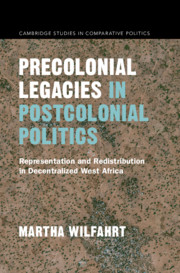 Precolonial Legacies in Postcolonial Politics
Precolonial Legacies in Postcolonial Politics In the final empirical chapter, I push beyond Senegal to look broadly across West Africa to assess the generalizability of my findings. Senegal is not the only West African state to display remarkable subnational variation in exposure to precolonial statehood nor to have recently undertaken decentralization reforms. I extend my coding of precolonial kingdoms to the subregion and match it to data from the Demographic and Health Surveys (DHS) and the Afrobarometer public opinion surveys to test the theory's generalizability. I find that areas of West Africa that were exposed to precolonial states have seen bigger gains in locally delivered public goods and that Afrobarometer respondents in these areas are more positive about their local governments and democratic practice than their counterparts in historically acephalous zones. While my theory is built around the specific legacies of precolonial statehood, the chapter's second half move beyond Africa to show the broader analytic leverage of the theory’s twin mechanisms of shared social identification and social network ties for Comparative Politics. The chapter concludes with a discussion of scope conditions for the argument.
To save this book to your Kindle, first ensure [email protected] is added to your Approved Personal Document E-mail List under your Personal Document Settings on the Manage Your Content and Devices page of your Amazon account. Then enter the ‘name’ part of your Kindle email address below. Find out more about saving to your Kindle.
Note you can select to save to either the @free.kindle.com or @kindle.com variations. ‘@free.kindle.com’ emails are free but can only be saved to your device when it is connected to wi-fi. ‘@kindle.com’ emails can be delivered even when you are not connected to wi-fi, but note that service fees apply.
Find out more about the Kindle Personal Document Service.
To save content items to your account, please confirm that you agree to abide by our usage policies. If this is the first time you use this feature, you will be asked to authorise Cambridge Core to connect with your account. Find out more about saving content to Dropbox.
To save content items to your account, please confirm that you agree to abide by our usage policies. If this is the first time you use this feature, you will be asked to authorise Cambridge Core to connect with your account. Find out more about saving content to Google Drive.